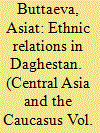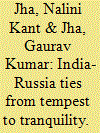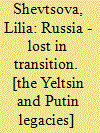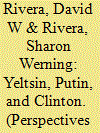|
|
|
Sort Order |
|
|
|
Items / Page
|
|
|
|
|
|
|
| Srl | Item |
| 1 |
ID:
118730


|
|
|
|
|
| Publication |
2012.
|
| Summary/Abstract |
In recent years, problems relating to the state and development dynamics of ethnic relations, which have an effect on the sociopolitical and moral-psychological atmosphere in Russia, are becoming an increasingly frequent target of study. Resolving sociopolitical problems is particularly important in the context of the current instability in the Northern Caucasus.
|
|
|
|
|
|
|
|
|
|
|
|
|
|
|
|
| 2 |
ID:
109732


|
|
|
| 3 |
ID:
095118


|
|
|
|
|
| Publication |
2010.
|
| Summary/Abstract |
To what extent does Russia face the threat of Islamic radicalization? This article provides an assessment of the nature and severity of the threat and its changing dynamics from the Yeltsin to the Putin periods in post-Soviet Russia. It argues that, contrary to many accounts, the threat was at its greatest during the late 1990s and in the Yeltsin period. Moreover, the Putin administration adopted a series of policies that have had some significant successes in stemming the flow of Islamic radicalism within Russia. This has involved a policy mix, including repression and coercion, most notably in the military campaign in Chechnya; diplomatic efforts in the Middle East and broader Muslim world to improve Russia's image; pro-active domestic policies to co-opt and support moderate Russian Muslim leaders and their communities; and attempts to construct a national identity and ideology which supports the multi-confessional and multinational nature of the Russian state and recognizes the Muslim contribution to Russian statehood and nationality. Although these policies have had their successes, there are also significant limitations, the most notable of which is the failure to address the problems of poor governance in the North Caucasus, which has sustained the Islamist insurgency in the region. The failure to develop an intermediary Muslim civil society in Russia more generally also contributes to the continuing appeal of Islamist radicalism, particularly among younger Russian Muslims.
|
|
|
|
|
|
|
|
|
|
|
|
|
|
|
|
| 4 |
ID:
081953


|
|
|
|
|
| Publication |
Washington, D C, Carnegie Endowment for International Peace, 2007.
|
| Description |
xvi, 388p.
|
| Standard Number |
9780870032363
|
|
|
|
|
|
|
|
|
|
|
|
Copies: C:1/I:0,R:0,Q:0
Circulation
| Accession# | Call# | Current Location | Status | Policy | Location |
| 053584 | 947.086/SHE 053584 | Main | On Shelf | General | |
|
|
|
|
| 5 |
ID:
097960


|
|
|
| 6 |
ID:
108207


|
|
|
| 7 |
ID:
087734


|
|
|
|
|
| Publication |
2009.
|
| Summary/Abstract |
While the desire to counterbalance US unilateralism informed Russian perceptions and advocacy of multipolarity globally, the complex and fluid balance of power in a multipolar East Asia complicates Russian perceptions and policies of multipolarity regionally and counterbalancing US power became not the sole goal. Russia's aim in East Asia was to reassert its influence while ensuring a stable regional environment in order for Russia to restore itself as a great power. However, the relatively stabilizing US regional role, the rise of neighboring China, the prospects of Japanese remilitarization and strengthened US-Japanese military alliance, and the lack of a Northeast Asian security structure are factors that pose both challenges and opportunities for Russian policymakers in pursuing Russian interests and great-power aims. Such factors have served to make Russian perceptions and policy in East Asia somewhat contradictory. While Russia's great-power aspiration was relatively clear, the policies to achieve this remained vague and inconclusive.
|
|
|
|
|
|
|
|
|
|
|
|
|
|
|
|
| 8 |
ID:
090868


|
|
|
|
|
| Publication |
2009.
|
| Summary/Abstract |
Immediately after coming to power, the Clinton administration declared the consolidation of market and democratic institutions in Russia to be a vital American interest. The administration's central tactic for promoting this outcome was to help Boris Yeltsin remain in power. In a major assault on Clinton's historical legacy, much of the scholarly community maintains that U.S. policy was fundamentally flawed, both morally and strategically. In the view of these analysts, post-Soviet Russia's founding president was an autocratic leader who derailed the country's progress toward democracy. However, this body of research focuses exclusively on the Russian Federation and fails to utilize comparative referents. In contrast, we analyze the experiences of the full population of post-communist states of Eastern Europe and Eurasia from 1991 to the present. Whether examined in cross-national or longitudinal perspective, we find that Russian democracy under Yeltsin was, relatively speaking, a success. We conclude that the Clinton administration's policy of support for Yeltsin both served various American foreign policy interests and strengthened the prospects for democratic consolidation in Russia, thereby fulfilling the dictates of both real- and idealpolitik. In addition, the relative success of Russia's democratization in the 1990s, the reversal of that pattern in this decade, and the magnitude of the transformation of the polity under Putin all demonstrate the pivotal role played by presidential leadership in Russia's transition
|
|
|
|
|
|
|
|
|
|
|
|
|
|
|
|
|
|
|
|
|